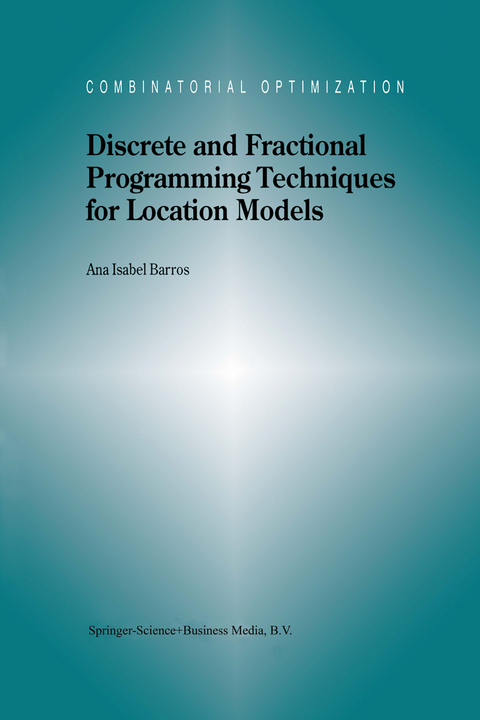
Discrete and Fractional Programming Techniques for Location Models
Seiten
2013
|
Softcover reprint of the original 1st ed. 1998
Springer-Verlag New York Inc.
978-1-4613-6824-3 (ISBN)
Springer-Verlag New York Inc.
978-1-4613-6824-3 (ISBN)
At first sight discrete and fractional programming techniques appear to be two com pletely unrelated fields in operations research. We will show how techniques in both fields can be applied separately and in a combined form to particular models in location analysis. Location analysis deals with the problem of deciding where to locate facilities, con sidering the clients to be served, in such a way that a certain criterion is optimized. The term "facilities" immediately suggests factories, warehouses, schools, etc. , while the term "clients" refers to depots, retail units, students, etc. Three basic classes can be identified in location analysis: continuous location, network location and dis crete location. The differences between these fields arise from the structure of the set of possible locations for the facilities. Hence, locating facilities in the plane or in another continuous space corresponds to a continuous location model while finding optimal facility locations on the edges or vertices of a network corresponds to a net work location model. Finally, if the possible set of locations is a finite set of points we have a discrete location model. Each of these fields has been actively studied, arousing intense discussion on the advantages and disadvantages of each of them. The usual requirement that every point in the plane or on the network must be a candidate location point, is one of the mostly used arguments "against" continuous and network location models.
1. Introduction. 2. Discrete Location Models. 3. Location Models and Fractional Programming. 4. Generalized Fractional Programming. 5. Summary and Remarks. Index.
| Reihe/Serie | Combinatorial Optimization ; 3 |
|---|---|
| Zusatzinfo | XVIII, 180 p. |
| Verlagsort | New York, NY |
| Sprache | englisch |
| Maße | 155 x 235 mm |
| Themenwelt | Informatik ► Theorie / Studium ► Algorithmen |
| Mathematik / Informatik ► Mathematik ► Analysis | |
| Mathematik / Informatik ► Mathematik ► Angewandte Mathematik | |
| Mathematik / Informatik ► Mathematik ► Finanz- / Wirtschaftsmathematik | |
| Mathematik / Informatik ► Mathematik ► Graphentheorie | |
| ISBN-10 | 1-4613-6824-3 / 1461368243 |
| ISBN-13 | 978-1-4613-6824-3 / 9781461368243 |
| Zustand | Neuware |
| Haben Sie eine Frage zum Produkt? |
Mehr entdecken
aus dem Bereich
aus dem Bereich
IT zum Anfassen für alle von 9 bis 99 – vom Navi bis Social Media
Buch | Softcover (2021)
Springer (Verlag)
CHF 41,95
Interlingua zur Gewährleistung semantischer Interoperabilität in der …
Buch | Softcover (2023)
Springer Fachmedien (Verlag)
CHF 46,15
Eine Einführung mit Java
Buch | Hardcover (2020)
dpunkt (Verlag)
CHF 62,85


